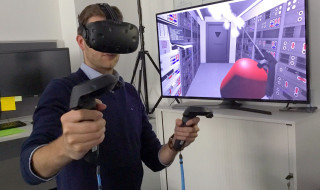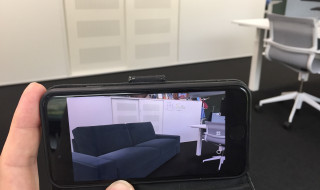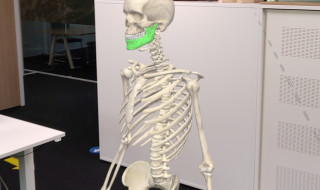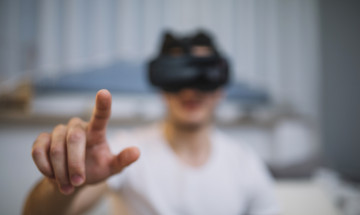Project: eXploRing VR, AR and MR
Extended reality (XR) can play an important role in research and education. But there are a few challenges in applying this relatively new technology. Such as sharing knowledge and applications, providing hardware, and privacy & ethics in using XR. We want to move forward on the use of XR in research and education, and tackle some of these issues.
XR makes the impossible possible
Virtual reality (VR) will be familiar to most people: the use of display and interaction technology, usually a head-worn device with hand-held controllers, which fully immerses you in a computer-generated world. The technology is used for entertainment, training & simulation, education, and research, also within the SURF community.
But the term extended reality (XR) might not be as well-known. XR is an umbrella term used to encompass the complete spectrum of technologies and human-computer interactions that range from fully virtual environments (VR) to environments that combine virtual elements with a view of the real world. The latter form is usually referred to as augmented reality (AR) or mixed reality (MR).
XR technology (so all of VR, AR and MR) can play several roles for research and education in the SURF community, with different applications for each of the three subsets of XR. Virtual reality can be used for providing virtual environments that would otherwise be difficult, impossible or dangerous to create. Augmented and mixed reality can be used to create insightful learning materials or research applications for topics where spatial understanding is important, or a real-world scene needs to be augmented with virtual objects and/or information.

Virtual reality (photo ESA)

Augmented reality (AR) using an iPhone

Mixed Reality, the user's view wearing a Microsoft HoloLens 2
Goal of the project
As it is still relatively early days in the development and application of XR technology there are a number of challenges in using and applying the technology, from sharing knowledge and applications, providing XR hardware to large groups of students, to issues relating to privacy and ethics.
The goal of this project is to have a starting point together with the SURF community to move forward on the use of XR in research and education and initially tackle some of these issues. More activities are expected to follow the current project in 2021 based on the priorities identified in the SURF 2Jarenplan 2021-2022 (Dutch only).
- Provide an overview and guidelines to those within the SURF community that want to familiarize themselves with XR, or want to experiment with XR without necessarily having the required technical knowledge. For this a "Getting started with XR" toolkit is being developed within the project that summarizes the basics and provides practical guidance.
- The use of 360 video in VR is a relatively straightforward form of XR that has many interesting uses in training and education. An existing 360 video framework from the University of Amsterdam is being extended to become more powerful with the goal of making it freely available within the Dutch research and education community.
- As mentioned in the introduction, VR as a technology is fairly well-known, while AR and especially MR are behind in exposure. So to give more insight into the possibilities of mixed reality, a separate blog post on the Microsoft HoloLens 2 is being prepared. This will give a more detailed overview of the device, its possibilities and limits in creating MR experiences.
- The use of "social VR" is further explored. This is especially relevant in the current situation with respect to covid-19, as the use of VR technology can provide more immersive social experiences and settings than plain video-conferencing. But it comes with its own challenges (for example the low availability of VR equipment).
- A SURF podcast on the subject of XR (see below).
- Finally, a new edition of the VARR Out event (on Virtual and Augmented Reality for Research) is planned for the beginning of 2021, with a concrete date to be announced. One of the goals of this event will be to gather input on future activities related to the SUF 2Jarenplan 2021-2022.
Project team SURF
Paul Melis
Casper van Leeuwen
Ben de Vries
Collaboration partners
Center for Innovation, Leiden University (Donna Schipper)
University of Amsterdam (Robert Belleman)
Delft University of Technology (Arno Freeke)

In the first part of this two-part series, we talk to Paul Melis, visualisation consultant at SURF, and Donna Schipper, creative developer at Centre for Innovation, about XR in education and research (in Dutch).
